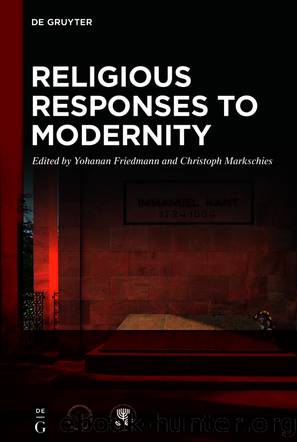Religious Responses to Modernity by Yohanan Friedmann Christoph Markschies

Author:Yohanan Friedmann, Christoph Markschies
Language: eng
Format: epub
Publisher: De Gruyter
Published: 2021-03-08T13:26:25.167000+00:00
Veblen thus ascribed the creativity of the Jewish intellectuals to their social marginality. This thesis may be further nuanced by reference to Georg Simmelâs essay on âThe Strangerâ (Der Fremde). Unlike the tourist or refugee, âwho comes today and goes tomorrow,â observed Simmel, the stranger is or rather has become a member of the society in which s/he dwells: She or he is a person âwho comes today and stays tomorrow.â32 The strangerâs position in the group in which he is now a member âis fundamentally affected by the fact that he does not belong in it initially and that he brings qualities into it that are not, and cannot, be indigenous to it.â33As a result, the stranger, as Simmel paradoxically puts it, is ânear and far at the same time.â34 Like Veblenâs marginal Jew, the stranger is âis freer ⦠practically and theoretically [than the native members of the group]; he examines conditions with less prejudice; he assesses them against standards that are more general and more objective; and his actions are not confined by custom, piety, and precedent.â35 The European Jew, whom Simmel seems to have had in mind, was such a stranger. By dint of his acculturation, he had become a cognitive insider, at home in the symbolic and intellectual discourse of his adopted culture. Yet, at the same, he remained by and large a social outsider. He was, in Simmelâs terms, ânear and far,â a cognitive insider whose position as a social outsider encouraged the assumption of a critical perspective on the norms and values of the society to which he was now culturally and intellectually bound.
Hence, integrated in the cognitive universe of a given society, the stranger â here the European Jewish intellectual â focused his or her critical dissent on either the proximate or the ultimate norms and values of that society. The proximate norms and values are the operative practices that are meant to support the ultimate axio-normative principles of a society. In the name of personal freedom as a societyâs ultimate norm and ideal value, one may protest that certain prevailing or âproximateâ practices actually undermine the realization of that norm and its attendant values. However, one may also find the ultimate axio-normative principles governing oneâs society to be fundamentally mistaken. In either case, the intellectual would voice axio-normative dissent within the cognitive universe of his or her society.
According to the degree and nature of their axio-normative dissent, European Jewish intellectuals may be cast as representing three typologically distinct postures: those who question the ultimate values and norms of society; those who critique its proximate values and norms from a conservative point of view; and those who do so from a liberal point of view. This typology of axio-normative dissent may be illustrated with respect to a, if not the key principle of Western modernity: The idea of progress as sponsored by the liberal ethos promoted by the Enlightenment. The first posture of this tripartite typology is one that questions the validity of the very idea of progress.
Download
This site does not store any files on its server. We only index and link to content provided by other sites. Please contact the content providers to delete copyright contents if any and email us, we'll remove relevant links or contents immediately.
| Africa | Americas |
| Arctic & Antarctica | Asia |
| Australia & Oceania | Europe |
| Middle East | Russia |
| United States | World |
| Ancient Civilizations | Military |
| Historical Study & Educational Resources |
Cecilia; Or, Memoirs of an Heiress — Volume 1 by Fanny Burney(32542)
Cecilia; Or, Memoirs of an Heiress — Volume 2 by Fanny Burney(31939)
Cecilia; Or, Memoirs of an Heiress — Volume 3 by Fanny Burney(31928)
The Secret History by Donna Tartt(19037)
Sapiens: A Brief History of Humankind by Yuval Noah Harari(14358)
Leonardo da Vinci by Walter Isaacson(13315)
The Radium Girls by Kate Moore(12013)
Sapiens by Yuval Noah Harari(5363)
How Democracies Die by Steven Levitsky & Daniel Ziblatt(5211)
The Wind in My Hair by Masih Alinejad(5085)
Homo Deus: A Brief History of Tomorrow by Yuval Noah Harari(4900)
Endurance: Shackleton's Incredible Voyage by Alfred Lansing(4764)
Man's Search for Meaning by Viktor Frankl(4573)
The Silk Roads by Peter Frankopan(4525)
Millionaire: The Philanderer, Gambler, and Duelist Who Invented Modern Finance by Janet Gleeson(4462)
The Rape of Nanking by Iris Chang(4200)
Joan of Arc by Mary Gordon(4098)
The Motorcycle Diaries by Ernesto Che Guevara(4088)
Stalin by Stephen Kotkin(3956)
